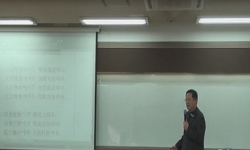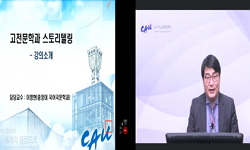In this paper, I examined the character of “evil” revealed in <Ong- Gojib-Jeon> from the point of “Seong-li-hag(性理學)”. After defining the characteristics in detail, the implications for understanding classic novels were discussed. ...
http://chineseinput.net/에서 pinyin(병음)방식으로 중국어를 변환할 수 있습니다.
변환된 중국어를 복사하여 사용하시면 됩니다.
- 中文 을 입력하시려면 zhongwen을 입력하시고 space를누르시면됩니다.
- 北京 을 입력하시려면 beijing을 입력하시고 space를 누르시면 됩니다.

<옹고집전>에 드러난 악(惡)의 성격 연구 - 성리학적 관점을 중심으로 = A Study on the Character of Evil Revealed in <Ong-Gojib-Jeon>
한글로보기부가정보
다국어 초록 (Multilingual Abstract)
In this paper, I examined the character of “evil” revealed in <Ong- Gojib-Jeon> from the point of “Seong-li-hag(性理學)”. After defining the characteristics in detail, the implications for understanding classic novels were discussed. In addition, this study attempted to examine the shape of “evil,” embodied by classic novels, exemplify it, and explain why it is not extreme evil. Seonglihag claimed absolute goodness and denied the existence of absolute evil. Therefore, it can be considered a perspective that explains why absolute wickedness does not appear in classic novels. With this premise, the subject of the study was <Ong-Gojib-Jeon>, where the main character’s evil deeds emerged as the key events of the novel. Because of the discussion, evil in seong- li-hag refers to a heart lacking goodness, a heart lacking in(仁), a heart lacking gyeong(敬), a heart lacking hyo(孝), a heart lacking ja(慈), the heart lacking sin(信). In addition, the ong-gojib of <Ong-Gojib-Jeon> can be seen that it is characterized as lacking in, gyeong, hyo, ja, sin. Then, ong-gojib realizes his deficiency and recovers those factors, leading to goodness. Through this analysis, it is confirmed that “evil” is complimentary to the “good” in “Seong-li-hag.” Therefore, it is possible to discuss the concrete shape of good as the manifestation of evil. Furthermore, it was confirmed that the specific characteristics of goodness in <Ong-Gojib-Jeon> include conditions such as “fulfilling responsibilities for a position” and “knowing to establish a proper relationship.” In other words, the goodness revealed in <Ong-Gojib- Jeon> can be said to be a social necessity. Encouraging goodness for maintaining social order also originated from social necessity, and it is difficult to say that it is embodying some amount of absolute evil.
참고문헌 (Reference)
1 김흥규, "현대비평과 이론 3" 한신문화사 1992
2 이정원, "해학적 악인 캐릭터 디자인을 위한 서사적 접근" 한국고소설학회 (23) : 153-176, 2007
3 서인석, "조선 후기 향촌 사회의 악인 형상" 국어국문학회 3 : 159-194, 1999
4 김경호, "조선 유학의 개념들" 예문서원 2002
5 안영상, "조선 유학의 개념들" 예문서원 2002
6 박학래, "조선 유학의 개념들" 예문서원 2002
7 김형찬, "조선 유학의 개념들" 예문서원 2002
8 차영덕, "옹고집전" 보리출판사 2007
9 곽신환, "악이란 무엇인가" 창 1992
10 신재홍, "숙향, 심청, 흥부의 덕목들" 한국고전문학교육학회 (19) : 205-232, 2010
1 김흥규, "현대비평과 이론 3" 한신문화사 1992
2 이정원, "해학적 악인 캐릭터 디자인을 위한 서사적 접근" 한국고소설학회 (23) : 153-176, 2007
3 서인석, "조선 후기 향촌 사회의 악인 형상" 국어국문학회 3 : 159-194, 1999
4 김경호, "조선 유학의 개념들" 예문서원 2002
5 안영상, "조선 유학의 개념들" 예문서원 2002
6 박학래, "조선 유학의 개념들" 예문서원 2002
7 김형찬, "조선 유학의 개념들" 예문서원 2002
8 차영덕, "옹고집전" 보리출판사 2007
9 곽신환, "악이란 무엇인가" 창 1992
10 신재홍, "숙향, 심청, 흥부의 덕목들" 한국고전문학교육학회 (19) : 205-232, 2010
11 이동희, "성리학의 선악관와이-와이(y-Y)의 사고 양태" 동양철학연구회 (50) : 287-324, 2007
12 성백효, "대학" 전통문화연구회 2011
13 성백효, "논어" 전통문화연구회 2005
14 서대석, "고전소설의 행복한 결말과 한국인의 의식" 서울대학교 국어국문과 3 : 233-242, 1978
15 서인석, "고전소설의 결말구조와 그 세계관 : 홍길동전·구운몽·군담소설을 중심으로" 서울대학교 대학원 1984
16 고정희, "고전문학의 시공간적 거리감과 문학사적 교육" 한국고전문학교육학회 (14) : 89-120, 2007
17 조희정, "고전 리터러시의 ‘시공간적 거리감’ 연구" 한국어교육학회 (119) : 61-93, 2006
18 강재철, "古小說의 懲惡樣相과 意義" 동양학연구원 (33) : 49-61, 2003
19 이강엽, "古典敍事物에 나타난 惡의 성격과 對處 樣態" 한국어문학회 (90) : 263-292, 2005
20 이강엽, "‘자기실현’으로 읽는 <옹고집전>" 한국고소설학회 (17) : 225-250, 2004
동일학술지(권/호) 다른 논문
-
1930년대 식민지 조선의 ‘인조인간’ 인식에 대하여: 인공지능 이전의 징검다리로서
- 한국문화융합학회
- 한미라
- 2019
- KCI등재
-
불완전하게 듣는 자의 윤리 - 기형도 시에서 ‘소리’의 위상과 ‘청자-화자’의 역할
- 한국문화융합학회
- 김수이
- 2019
- KCI등재
-
디자인 교육에 대한 유아교사 인식 및 요구도 조사 연구 - 유아의 창의력 증진을 위한 3D 프린터 활용 중심으로
- 한국문화융합학회
- 이종길
- 2019
- KCI등재
-
딜레마 토론 과정에서 나타난 유학생들의 윤리 의식 탐색
- 한국문화융합학회
- 이소현
- 2019
- KCI등재
분석정보
인용정보 인용지수 설명보기
학술지 이력
| 연월일 | 이력구분 | 이력상세 | 등재구분 |
|---|---|---|---|
| 2026 | 평가예정 | 재인증평가 신청대상 (재인증) | |
| 2022-03-24 | 학술지명변경 | 한글명 : 문화와 융합 -> 문화와융합 |  |
| 2022-03-16 | 학회명변경 | 영문명 : The Korean Society of Culture and Convergence -> The Society of Korean Culture and Convergence |  |
| 2020-01-01 | 평가 | 등재학술지 유지 (재인증) |  |
| 2017-01-01 | 평가 | 등재학술지 선정 (계속평가) |  |
| 2015-01-01 | 평가 | 등재후보학술지 선정 (신규평가) |  |
| 2014-03-04 | 학회명변경 | 한글명 : 문학과언어학회 -> 한국문화융합학회영문명 : Munhak Kwa Eoneo Hakhoi -> The Korean Society of Culture and Convergence |
학술지 인용정보
| 기준연도 | WOS-KCI 통합IF(2년) | KCIF(2년) | KCIF(3년) |
|---|---|---|---|
| 2016 | 0 | 0 | 0 |
| KCIF(4년) | KCIF(5년) | 중심성지수(3년) | 즉시성지수 |
| 0 | 0 | 0 | 0.13 |




 스콜라
스콜라




